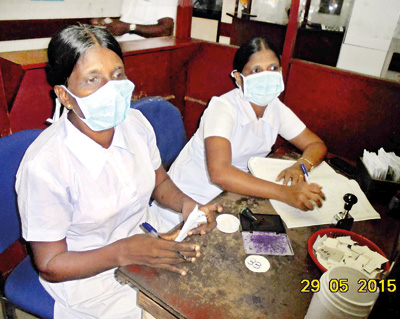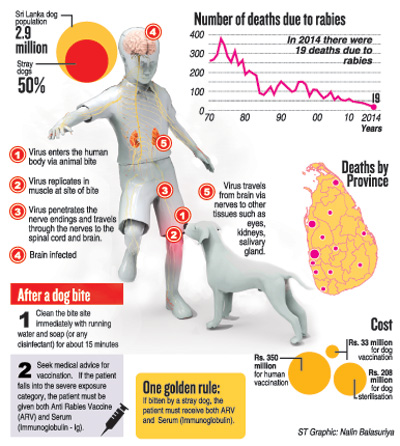News
‘Flu’ claims 8 including 6 pregnant women; Lanka on AH1N1 alert
The death of eight persons including six pregnant women afflicted by the seasonal flu in the last two months has put Sri Lanka’s health system on alert, calling on all pregnant mothers to seek immediate medical treatment when showing signs of a mild temperature or cough.

Matara hospital: Nurses taking precautions before attending to patients
The dead include one each from Galle, Batticaloa, Kalubowila, Darga town, a police constable from Panadura, and two from Kegalle. T he Health Ministry’s Epidemiology Unit (EU) said that immediate treatment should be sought from a qualified doctor in case of a temperature greater than 38 degrees centigrade accompanied by a persistent cough.
Senior Registrar EU, Dr. Athula Liyanapathirana said the Health Ministry has issued instructions to all outpatient doctors, General Practitioners (GPs) and Public Health Inspectors (PHIs) to have pregnant mothers reviewed by a Consultant doctor or gynaecologist.
In addition, the Health Ministry said that children under two, elderly people over 65 years, and those who have a compromised immune system due to an existing chronic illness, should be reviewed within 24 hours by a qualified GP. It is advocated that if symptoms persist they should be hospitalised.
Healthy people who may have flu-like symptoms should be reviewed for 72 hours with normal doses of paracetomol, and seek treatment thereafter if symptoms persist. It is advised that, as the flu virus ‘mimics’ the dengue flu symptoms, the patient should be cautious and seek treatment after three days.
This disease is generally a mild illness similar to the seasonal flu. Its symptoms usually include fever, runny nose, sneezing, sore throat, cough, headache and muscle or joint pains. These symptoms may last for a few days or up to a week, and may not require specific anti viral treatment.
Dr Liyanapathirana said that all Medical Officers of Health (MOH), Regional Health Officers and GPs have been advised through circulars, and posters and leaflets issued to inform/enlighten the public on precautionary measures to be taken. About 55% of patients seek treatment from private doctors. The Health Ministry has not recommended wearing masks to avoid contracting the disease, but stresses on following general hygiene such as washing hands, avoiding public transport/places and persons showing symptoms of the disease.
The flu that is prevalent now is a seasonal one that emerges generally in May, June, July, December, January and February. There are different strains that dominate every cycle, and this time it is the AH1N1 virus (causing the swine flu). However, the Health Ministry says there is no cause for alarm as the strain has lost its virility and now exists in a milder form.
The first death from swine flu was of a 16-year-old boy in November 2009. Since then, from February 2010 there have been reported 642 confirmed cases of H1N1 with 48 deaths including seven pregnant women.
 In India, around 700 people died of the disease in 2014. Transmission of the virus is from human to human, and doctors claim the sicknesses is harmless with no complications in a majority of the cases, except for those with Asthma, Cardiovascular diseases, Hematological diseases, metabolic disorders, diabetes, are HIV positive, spinal cord injuries and those afflicted with seizures.
In India, around 700 people died of the disease in 2014. Transmission of the virus is from human to human, and doctors claim the sicknesses is harmless with no complications in a majority of the cases, except for those with Asthma, Cardiovascular diseases, Hematological diseases, metabolic disorders, diabetes, are HIV positive, spinal cord injuries and those afflicted with seizures.
Vaccine
The Health Ministry conceded a short supply of the H1N1 vaccine in its Medical Supplies Division (MSD) at present.
Dr Athula Liyanapathirana said that no decision has been taken to import the vaccine as the Health Ministry is reviewing its importation due to the high cost involved. “The cost could run into billions of rupees,” he said.
He added that the vaccine does not give lifelong immunity, lasting only for 18 months, as the virus is mutating. “The vaccine becomes ineffective with time,” he said. He also said that, the private sector intendss to import the vaccine, and those interested could get ‘immunised’ privately. “It will cost around Rs 2,500 to Rs 3,000 a ‘shot’,” he said.
“However, the best way to protect oneself from the virus is to avoid crowded places, public transport, coming into contact with those showing symptoms of respiratory diseases, and by wash hands thoroughly,” he explained. The following measures are advised for H1N1 patients directed for homecare by the Health Ministry
Adults-
Managing H1N1 Influenza at Home • Take supportive medication as prescribed e.g. non aspirin drugs for fever, anti allergic drugs for sneezing and runny nose and antibiotics for a possible bacterial infection • Stay away from work/school and other public places and crowded settings for seven days after onset of symptoms, or until 24 hours after symptoms subside – whichever is longer • Take bed rest • Take plenty of liquids • Maintain a good diet • Avoid close contact with family members and wear a face mask or a clean handkerchief/cloth over nose and mouth on such occasions if possible • Wash hands frequently with soap and water and specially after touching face • Cough and sneeze into the elbow or into a handkerchief, which should either be disposed safely or washed with soap and water when wet. Seek medical attention urgently if the symptoms worsen or develop any of the danger signs: In Adults – Breathing difficulty or shortness of breath – Severe or persistent vomiting – Pain or pressure in the chest or abdomen – Sudden dizziness – Confusion – Flu -like symptoms sometimes improving but then returns with fever and severe cough.
Children-
Fast breathing or trouble breathing – Bluish or grey colour skin – Not drinking enough fluids – Reduced urine output or no tears when crying – Severe or persistent vomiting – Not waking up or not interacting – Being irritable that the child does not want to be held – Flu -like symptoms improving but then to return with fever and worse cough.
Director- Lady Ridgeway Hospital, Dr Kumara Wickramasinghe:
Many patients reporting with flu-like symptoms and OPD visits are increasing with at least 300 patients exhibiting similar symptoms every day. Severe cases are being hospitalized, and even treated in the Intensive Care Unit. No deaths reported.
Consultant Virologist-
Medical Research Institute,
Dr Jude Jayamaha:
The predominant strain this season is AH1N1. Already, we have tested 220 positive cases. Vaccines do not give lifelong immunity, unlike in chickenpox and other contagious diseases. The salient feature is that the person’s immune system deals with the virus. It is those with a compromised immune system who are vulnerable.

